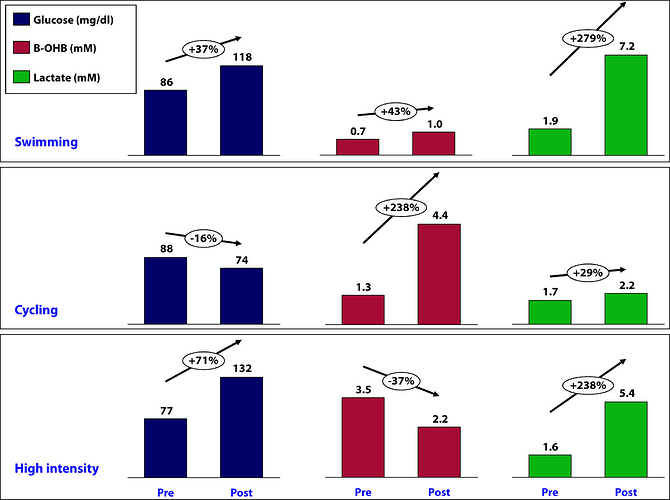I started out my keto journey with high (120) fasted glucose and near zero ketones. This was 18 months ago.
In the process of getting ketone adapted, I’ve gone through many stages but this latest one seems different.
I used to start my day with high glucose and low ketones (liver “morning” glucose spike), and my ketones would slowly climb until I ate something. Then they’d drop and slowly go back up again… and repeat. Exercising (in moderation) used to reduce my glucose and have little effect on ketones.
After IF, EF 4 days, then 5, then 7, and finally 12 days - I’m now upside down:
I wake up at my highest ketone level and it gradually decreases if I’m active. If I exercise, it drops a lot. If I rest, my ketones rebound back up. If I exercise or exert myself, they drop again… sleeping or just resting brings them back up again. If I eat fatty foods, they climb much higher very quickly… and I feel great. If I exercise, they drop again.
So now:
Sleeping, resting, eating fat - increases ketones
Exercising, beings active or eating higher protein - reduces ketones.
Has anyone seen this in any study or research? Has anyone experienced this reversal?
My theory is that I’m adapted to where the normal energy cycles where glucose was dominant have flipped to ketones… I wake up high with ketones to give me morning energy… then I consume ketones with activity and resting gives my liver a chance to replenish glycogen and generate more ketones. When I eat fat, my ketones rise quickly - this is akin to eating carbs = glucose rises rapidly… it’s better because ketones are not dangerous like glucose, but it mimics the (usual) “eat carb - make glucose” cycle.
I read a lot of the literature on this but I haven’t seen this.


